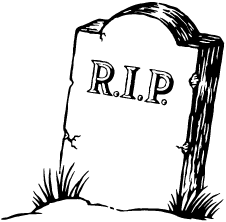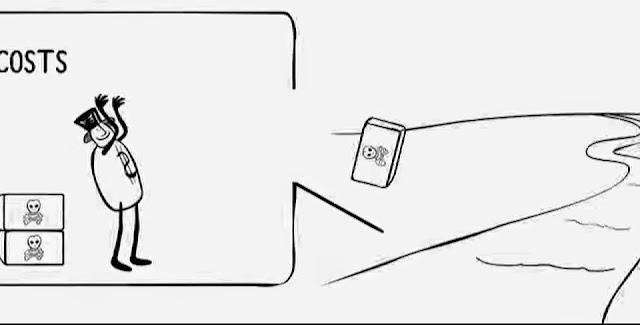 Happy New Year.
Happy New Year. The E-Waste Export Controversy died in 2017. All around, I see people leaving the bandwagon, addressing new emergencies (piles of CRT glass abandoned domestically), addressing new waste concerns (markets for plastics, mattress processing)
It took 5 more years after the key proponent of the "shocking" statistic about 80% e-waste dumping overseas basically admitted to making it up while soliciting donations (no proceeds of which went to the children in their "e-waste" photos) for the press to stop breathing new life into the ewaste export hoax.
Here and there, a few neophytes still refer to the E-Waste Export Controversy, recalling Annie Leonard's Story of Stuff cartoon or a poorly written UNEP press release. UNEP for too long used photos to imply widespread dumping, working "90%" into release with pictures of kids standing on junk, despite chart after chart that disproved the 2010 narrative. Self promoting "Ewaste Tech" fundraisers claim to have eyewitnessed thousands of orphans burning circuit boards in Agbogbloshie. And wanna-comeback glam-rockers like Placebo's Brian Molko film scrappers holding burning rubber tires over their heads, paying them for a nice dinner... paying scrappers to monkey around with fire that otherwise fails to support itself (adding little if any value to wire).
The game is over. Today, most reporters following up on a BAN press release find plenty of studies and articles, from numerous sources, debunking the NGO's past "reports". BAN's executive leader often writes an op-ed attacking the credentials of the critic, but that has shown diminishing returns. We said it here ten years ago: "Pay no attention to that man behind the curtain".
Taking a page from Scott Adams Dilbert blog, I'll take a minute to boast about my forecast of the defeat of the e-waste hoax, predictions of the ties that would emerge from the NGO's IRS990s, the involvement of "Big Shred" and "Planned Obsolescence" funding, and the shadow of racial profiling. In 2010's Blog "Slums and Recycling and Environmental Justice" diagnosed and foreshadowed the ailment. In future blogs, I will tell you my secrets, with which you too may win bigly.
"Out of the hottest fire comes the strongest steel." Chinese Proverb
Of 41 photos in the 2015 UNEP report on "90 percent" (cough, cough) mismanagement, eight purported to depict the situation in Ghana. As you can see below, there's not actually much evidence of anything the City of Ghana wouldn't generate daily. In fact, if anything, there was not enough "e-waste". But the "slums and recycling and environmental justice" complex knew a "money shot" when they saw it.
Now Europe is backtracking. This morning I'm leaving with Emmanuel Nyaletey, a former staffer at Good Point Recycling's tech room, who got a full scholarship for a degree in Coding from Georgia Tech (Atlanta). Emmanuel will be presenting at the ICM Congress in Salzburg this week, to the same group of European experts who put Jim Puckett and I on the same panel a year ago. My message then was basically "ask African Tech Sector workers what is going on, not white guys".
And ICM will benefit. However Emmanuel's presentation goes (or the trip we take together afterwards to Accra, Kumasi and Tamale), the Europeans accepted Robin's Rule. It's much bigger than a recycling debate.
Robin's Rule: Get the most variety of perspectives (preferably from the actual geographic or societal location). Test those points of view with the most intelligent people you can find who disagree with you.
This is a rule that applies not just to the environment, but to love, savings, home selection, university applications, etc. My kids are all in college, and they are surrounded by people who looked at college rankings (QS, USNWR, Forbes, AlumniFactor, etc) to choose colleges to apply to. I tell them that the professors at the schools are roughly the same, BU and Harvard swap faculty all the time. And don't fall in love with a campus visit or tour guide impression.
As I told 108 new US Peace Corps volunteers arriving in Cameroon, as Cross-Culture trainer, in 1986, what you look for in seeking a place are rankings, statistics, impressions, interviews. What you remember when you LEAVE college are 2 things: A person (professor, roomate, girlfriend, teammate), and how much money you owe.
To get the most value out of 4 years of college, or 2 years of Peace Corps, or 8 years of blogging, here's what to look at:
A) the intelligence and work ethic of the class peers. If your classmates are intelligent and hard working, you are likely to try to keep up.What doesn't work are is A) Arguing with dumb people (liberal snowflakes or alt right bigots), and B) a university that doesn't nurture diverse OPINION. The environmentalists who promoted the e-waste certification, regulations, PACE rules, and export bans are all good people who unfortunately were trapped in a roomful of group-think, led by people tainted with financial interests.
B) the level of disagreement in the discourse. If you have to, adapt an opinion no one else holds, just to hear the best (and weakest) arguments from the smartest people.
| Trading on Distortion, Dr. Josh Lepawsky http://resource-recycling.com/node/6803 |
Preening our social networks to surround ourselves with confirmation bias is the biggest trap right now. The Tribal nature of humans has evolved us to listen to familiar noises, and to beware the strange. We grow up, in Arkansas or Cairo or Guangzhou, hearing familiar opinions of family and friends who agree with each other. It's jarring to suddenly be within "earshot" or "meme-shot" of totally different opinions. But the type of people who circle the wagons and try to recreate familiar village noises are the same on both the right and left. Moderates are generally smarter, because we realize reality is complicated. "Story of Stuff Man" throwing cartoon computer waste into a sea container is a myth, and when the UK Environmental Agency tried to arrest that person, they put Joe Benson, a Nigerian born career TV Repair Technician, into a UK prison, at taxpayer expense. Nothing good happened. But that same "self certainty" or arrogance can happen in any environment where we surround ourselves with confirmation bias. That's why ICM's invitation to Emmanuel Nyaletey is so important.

Christian Universities like Liberty in Virginia have long self-selected uniform opinion (on the right of the political spectrum) and that has had a consequence for the faculty they can attract and the student body. I do not recommend it. But highly selective colleges, like Middlebury, need to stay clear of the same trap. Diversity is not just a color. And if students start to shut down points of view in a mental "safe space", they risk breeding the same cultish environment as the alt right they mock and rally against.
"Out of the hottest fire comes the strongest steel." Chinese Proverb
Three Agbogbloshie scrappers have told me they are afraid if they leave the wire burning site that they will stop meeting white photographers who "dash" them money to pose with burning plastic.
An insider in the EU has confided to me that the "poverty porn" photos in UNEP reports are placed there deliberately to secure their funding to research the topic -- but that people are looking for other jobs. INTERPOL quietly pulled the plug on the cringe-worthy titled "Project Eden". At my suggestion a year ago, ICM, Europe's most prestigious Waste Electric and Electronic Equipment (WEEE) conference, has invited Emmanuel E.P. Nyaletey to address the Congress. Emmanuel is from Ghana's Tech Sector, he's on WR3A's Fair Trade Recycling Board of Directors, and is now a computer programmer at Georgia Tech in Atlanta. And BAN's hard-wrought 501-c(3) tax-exempt status (reserved for non-political charities focused only on donations to the poor in BAN's photos, who never see a dime of the money spent to introduce e-waste legislation), appears to be a buggy whip in the new 2018 Tax Code.
 Eight years ago, one of the highest-read and most influential blogs, RIP The Pledge of True Stewardship, foreshadowed the change from companies and NGO's showing poverty porn photos and making "Pledges" and "Commitments" and pointing fingers at competitors. But it led to a kind of doubling-down, through expensive and self funding certification programs. Basel Action Network now runs on revenues from its "E-Steward Certification", which basically uses the same finger pointing tactics to distinguish itself from the more successful and widely-embraced certification, the R2 Standard from SERI. But E-Stewards is dead, they just don't know it. And R2 finds itself with an internal struggle between "free and fair trade" companies and those still seeking to create hurdles for new competitors. In other words, it is becoming what I call a "Barbershop Certification". As if there is no possible cure for a bad haircut, a whole industrial protectionist complex is arising to "self regulate" every industry. As the pendulum swings and strong winds blow against government regulation of industry, the seduction of "industry self certification" loses the threat it hedges itself against.
Eight years ago, one of the highest-read and most influential blogs, RIP The Pledge of True Stewardship, foreshadowed the change from companies and NGO's showing poverty porn photos and making "Pledges" and "Commitments" and pointing fingers at competitors. But it led to a kind of doubling-down, through expensive and self funding certification programs. Basel Action Network now runs on revenues from its "E-Steward Certification", which basically uses the same finger pointing tactics to distinguish itself from the more successful and widely-embraced certification, the R2 Standard from SERI. But E-Stewards is dead, they just don't know it. And R2 finds itself with an internal struggle between "free and fair trade" companies and those still seeking to create hurdles for new competitors. In other words, it is becoming what I call a "Barbershop Certification". As if there is no possible cure for a bad haircut, a whole industrial protectionist complex is arising to "self regulate" every industry. As the pendulum swings and strong winds blow against government regulation of industry, the seduction of "industry self certification" loses the threat it hedges itself against.A friend asked me last week how I was able to see this, so far ahead of time (2010 blogs)? How did I make the mental connections between "barbershops" or "gas stations" or "laundry mats" and see through the koolaid colored glasses the whole recycling industry viewed the "third world" a decade ago? How (not endorsing this broad claim) did a single blogger bring the press and academia to a standstill, starving Basel Action Network from its oxygen of hyperbole, its recipe of guilt-tripping white consumers into demanding payment from recyclers to their Seattle Washington office?
By walking a mile in the other man's shoes.
Gotta truncate this. I hope to write about more Theory of Knowledge, less about geeky appliances, in 2018.
https://www.ipetitions.com/petition/free-hurricane-joseph-benson-innocent-of

No comments:
Post a Comment